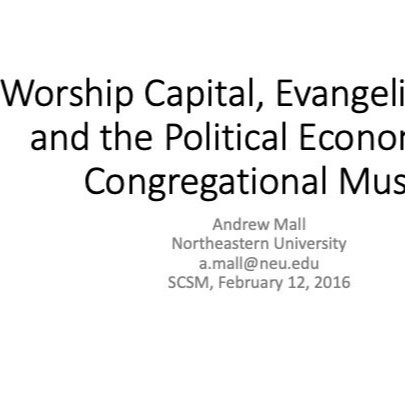
Worship Capital, Evangelicalism, and the Political Economy of Congregational Music
SCSM conference presentation (2016). Building upon the works of Pierre Bourdieu, analyses of music industries, and contemporary discourses of intellectual property, this paper outlines a theoretical framework for the political economy of worship music and considers barriers to integrating this framework into our scholarship and practice. This research emerges from several years of ethnographic fieldwork at the Anchor Fellowship, a non-denominational evangelical church in Nashville, Tennessee, and advances the concept of “worship capital” to capture the various ways in which individuals and institutions invest in worship.

Music Festivals as Scenes: Producing Ephemeral Space Annually at Cornerstone Festival
SEM conference presentation (2015). Based on interviews with festival staff, historical research, and ethnographic fieldwork in 2009–2012—including time working on the festival’s setup, stagehand, and teardown crews—this paper examines the production of space and place at Cornerstone Festival. In doing so, it contributes a vital link between scene theory and the growing ethnomusicological literature on festivals.

Studying Worship Capital: Cultural Insiderness, Religious Outsiderness, and Political Economy in Evangelical Worship
Yale ISM Fellows’ Lunch presentation (2015). The presence of capital in Christian worship is unmistakable, enabling individuals and institutions to participate in the production, distribution, mediation, and consumption of worship music. Performing artists, songwriters, and ministers operate in markets that shape the aesthetics of songs that congregations sing every Sunday morning. This worship economy, however, remains undertheorized in congregational music studies.

Capital, Class, and Congregational Matters: The Political Economy of Worship Music
Christian Congregational Music conference presentation (2015). Building upon the works of Pierre Bourdieu (1984, 1986, 1993), Jacques Attali (1985), and contemporary discourses of intellectual property, how might we consider the ways in which other forms of capital (cultural, intellectual, religious, social, etc.) are implicated in these markets? How do markets mediate between distinct congregations and globalized worship industries? This paper outlines a theoretical framework for the political economy of worship music, considering the roles of capital(s) in its production, distribution, mediation, and consumption.

From the Margins to the Mainstream: Two Crossover Cases
Embracing the Margins symposium presentation (2015). In a critical analysis of two crossover songs, I examine the ways in which ethics and aesthetics are implicated in crossover success—what Jason Toynbee and others have described as “mainstreaming,” and what Dick Hebdige has identified as the dominant culture’s integration of subcultural style via the commodity form. This paper thus moves beyond comparative or categorical definitions of margins and mainstreams to theorize the process of one becoming the other.

Popular Music Margins Becoming Mainstreams: Amy Grant, Elliott Smith, and the Political Economy of Niche Markets
Brown Music colloquium presentation (2015). What happens when artists transcend the margins and their markets? I examine the ways in which ethics and aesthetics are implicated in crossover success—what Jason Toynbee (2002) has described as “mainstreaming,” and what Dick Hebdige (1979) has identified as the dominant culture’s integration of subcultural style via the commodity form. This paper thus moves beyond comparative or categorical definitions of margins and mainstreams to theorize the process of popular music in transition from one market to another.

Histories and Industries: Music and Research in the Age of Digital Reproduction
HAIKU conference presentation (2014). A greater, more comprehensive historical understanding of our music industries can both increase our potential as scholars to enact and affect real change outside of the academy and our students’ potential to succeed in whatever area of musical inquiry, performance, or mediation they choose.

Subculture as Liturgy: Resistance and Worship among Subcultural Christians
Christian Congregational Music conference presentation (2013). Based on several years’ of ethnographic research, this paper examines the musical practices of two subcultural Christian communities in the U.S.: Nashville’s Anchor Fellowship and western Illinois’s Cornerstone Festival. Music and congregational song are very important to these liminal spaces, challenging old boundaries and defining new ones. Subculture itself becomes liturgical, and the political potential of corporate worship and popular music is often made explicit. In illustrating these communities, their sounds, and their ideologies, this paper both demonstrates the utility of subcultural theory to the study of congregational song and challenges Hebdige’s dialectic of incorporation.
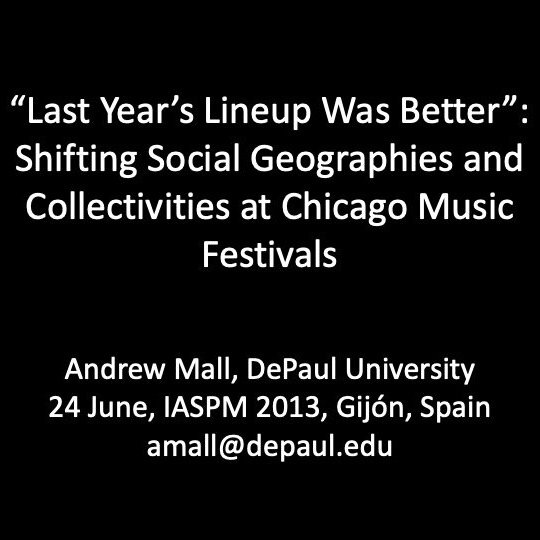
“Last Year’s Lineup Was Better”: Shifting Social Geographies and Collectivities at Chicago Music Festivals
IASPM conference presentation (2013). Drawing on many years of ethnographic research in Chicago, Illinois, this paper compares and contrasts several civic and commercial popular music festivals, such as Blues Fest, Cornerstone, Jazz Fest, Lollapalooza, and Pitchfork. I use mutable, multi-dimensional center-periphery theory to illustrate and explain the social flows within festival spaces, the differentiating strategies of festivals, and the compromises that emerge when organizers reconcile their needs with their audiences’ expectations. In examining the intersecting and overlapping representations of mainstreams and undergrounds at music festivals, my paper contributes to research on the political economies, social geographies, and taste communities of popular music events.
“We Are Called Here to Worship Together”: Ethnographic Outsiderness and Insiderness in Religious and Popular Culture
SEM conference presentation (2012). In this paper, based on several years of ethnographic research at the Anchor Fellowship, I address the challenges of fieldwork as a religious outsider and cultural insider. In constructing a rich description of an Anchor worship service based on my observations, those of church-goers, and formal interviews of Anchor pastors, this paper confronts the multivalence of experience and the interpretation thereof, demonstrating the importance of phenomenology to ethnography of religious and popular cultures.
The Price of Profit? Changing and Challenging Priorities in the Christian Recording Industry
SEM conference presentation (2011). In this paper, I examine EMI Christian Music Group (CMG), a major Christian record label (and division of EMI Ltd.), headquartered near Nashville, Tennessee. I provide a value-neutral analysis of the intersections of commerce, aesthetics, and theology. As with Keith Negus’s (1992, 1999) ethnographic research within the recording industry, my study illustrates that major record label practices and priorities are more nuanced than may be visible to outside observers.
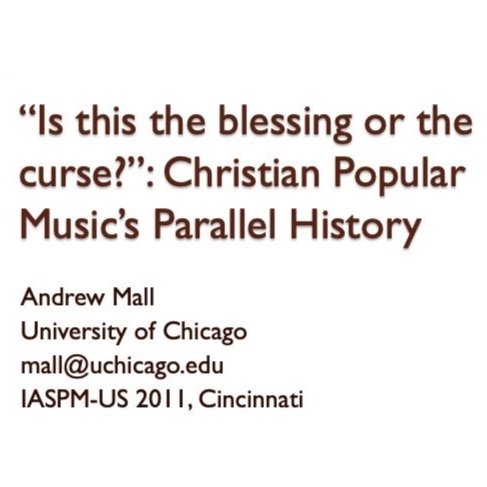
“Is This the Blessing or the Curse?” Christian Popular Music’s Parallel History
IASPM-US conference presentation (2011). In this paper, I examine the historical forces that shaped the CCM industry as separate and distinct from the mainstream industry, and consider how these forces have also contributed to the relative absence of scholarship on Christian popular music within popular music studies’ canons. I rely primarily on historical and ethnographic research on the Christian popular music recording industry undertaken for my dissertation in 2009–2010.
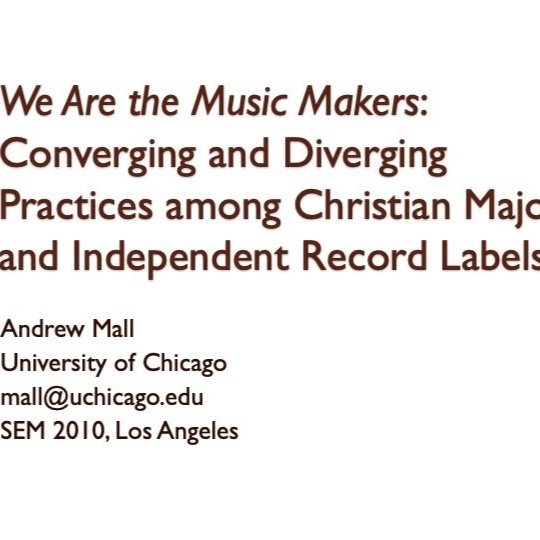
We Are the Music Makers: Converging and Diverging Practices among Christian Major and Independent Record Labels
SEM conference presentation (2010). Based on ethnographic fieldwork and interviews with Christian music recording industry “cultural intermediaries” in 2009–2010, this paper’s nuanced study of Christian record labels contributes to a broader center-periphery perspective on the mediation of popular music in the United States.

Lost in the Sound of Separation: Mainstreams and Alternatives at a Christian Rock Festival
SEM conference presentation (2009). How do the performers, mediators, and listeners of alternative Christian rock negotiate these multiple tensions? How can their negotiations contribute to existing conceptions of mainstreams and alternatives? Describing the lived experiences of Cornerstone participants requires a perspective more subjectively nuanced than the strict dichotomies of previous models. In working through these ideas, this ethnography studies the ways in which Cornerstone contributes to participants’ self-conception of their Christian lifestyle: mainstream, alternative, and in-between.
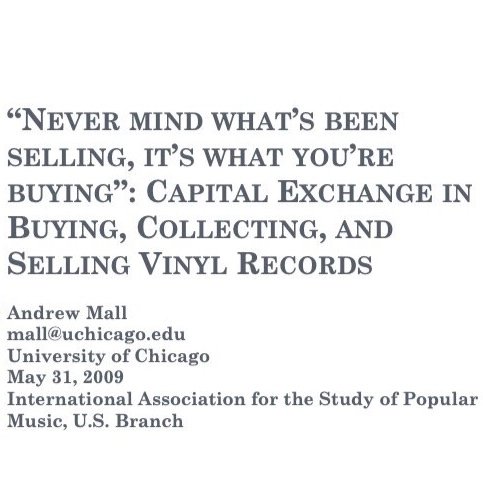
“Never Mind What’s Been Selling, It’s What You’re Buying”: Capital Exchange in Buying, Collecting, and Selling Vinyl Records
IASPM-US conference presentation (2009). Who holds the upper hand at record fairs? The dealers sell the commodities, yes, but the collectors decide what to buy, from whom, and (often, via bargaining) for what price. While dealers frequently self-identify as collectors, interactions between dealers and collectors necessarily rely upon the commodity status of music recordings and their role in the exchange of economic, cultural, and social capital. Through ethnographic research at Chicago-area record fairs, I explore the tensions between record dealers and record collectors, and investigate the ways in which capital and exchange contribute to musical meaning.

“I Heard You Have a Compilation of Every Good Song Ever Done by Anybody”: Subjectivity, Exchange, and Interaction at Record Fairs
MIDSEM conference presentation (2009). Record fairs are regular events where dealers rent tables from the organizers to sell vinyl records, CDs, and music memorabilia to the general public. Through ethnographic research at Chicago-area record fairs and interview data, I examine the different expectations—both of record dealers and collectors—that can help us examine the subjective, one-to-one economic interactions that make up the lived experiences of the record fair event.

Steady Diet of Nothing: Affinities, Sacrifices, and Change at Record Fairs
SEM conference presentation (2006). Building on Will Straw’s confluence of cosmopolitanism (“attentiveness to change occurring elsewhere”) and connoisseurship in his study of communities within popular music, this paper explores issues of everyday practice and changing identity through an ethnography of record dealers—individuals who act both as mediators and audience members within popular music exchange—using record fair events as the primary public cultural space.
“Tell Everyone We’re Dead”: Underground Rock and Its Canon
MIDSEM conference presentation (2006). The rock canon, comprised of music that is surrounded by extensive critical discourse, transcends the temporal specificities inherent in popular music. What do critics find transcendent about canonical rock music? How does the emergence of a canon function for underground rock (music distributed primarily through non-commercial radio stations and independent record stores)? This paper approaches these questions through the context of ethnographic work at a non-commercial radio station in Chicago.
Search and navigate extras
- 1A
- AAR
- Agence France-Presse
- AMS
- Amy Grant
- ARSC
- awards
- Baylor University
- Beer & Hymns
- Beyonce
- BFE
- Birmingham
- Boston
- Cambridge
- capital
- CCM
- CCMC
- Chicago
- Christian rock
- Christianity Today
- CNBC
- community
- congregational music
- crossover
- DePaul University
- discography
- DIY music
- documentaries
- emo
- Entertainment Weekly
- ethics
- festivals
- Fleetwood Mac
- Forum Daily News
- Furnace Fest
- Future of Pop
- Fyre Fest
- gamelan
- God Rock Inc
- hardcore
- IASPM
- IASPM-US
- introductions
- Keith Green
- Larry Norman
- Las Vegas
- Lindsey Buckingham
- Live Nation
- MEIEA
- mental health
- methods
- Michael Tait
- MIDSEM
- Money 4 Nothing
- music industries
- Nashville
- New England Conservatory
- Newsweek
- Northeastern Global News
- Northeastern University
- Nylon
- Oasis
- Ottawa
- panels
- Philadelphia
- podcast
- Pop Con
- Portland Press Herald
- punk
- radio
- record labels
- Rock Hall
- Rock That Doesn't Roll
- SAM
- San Antonio
- scene
- SCM
- SCSM
- SEM
- sing-alongs
- SMT
- Spotify
- Stevie Nicks
- streaming
- subculture
- Super Bowl
- Taylor Swift
- television
- Ticketmaster
- TicketNews
- TikTok
- TIME
- Tufts University
- Universal Music Group
- University of Chicago
- University of Pennsylvania
- vinyl
- Washington Post
- Whitney Houston
- worship
archives
- October 2025 1
- September 2025 3
- August 2025 3
- July 2025 3
- June 2025 2
- May 2025 8
- April 2025 4
- March 2025 1
- February 2025 3
- January 2025 1
- December 2024 4
- November 2024 2
- October 2024 1
- September 2024 1
- August 2024 3
- June 2024 3
- May 2024 1
- April 2024 5
- March 2024 2
- February 2024 6
- January 2024 1
- December 2023 4
- November 2023 2
- October 2023 4
- September 2023 1
- August 2023 1
- July 2023 1
- May 2023 1
- April 2023 2
- December 2022 2
- November 2022 1
- October 2022 3
- September 2022 3
- August 2022 1
- May 2022 1
- April 2022 1
- March 2022 2
- January 2022 1
- November 2021 1
- October 2021 3
- September 2021 3
- August 2021 2
- July 2021 3
- June 2021 2
- May 2021 6
- April 2021 11
- March 2021 2
- February 2021 2
- January 2021 2
- December 2020 1
- November 2020 3
- October 2020 1
- September 2020 1
- July 2020 1
- March 2020 1
- February 2020 3
- January 2020 1
- December 2019 1
- November 2019 4
- October 2019 1
- August 2019 1
- July 2019 1
- June 2019 1
- May 2019 1
- April 2019 1
- March 2019 4
- January 2019 2
- December 2018 1
- November 2018 1
- October 2018 2
- September 2018 1
- May 2018 1
- March 2018 3
- December 2017 1
- November 2017 2
- October 2017 1
- September 2017 2
- May 2017 1
- March 2017 1
- February 2017 1
- December 2016 2
- September 2016 1
- May 2016 1
- March 2016 1
- February 2016 1
- December 2015 1
- November 2015 2
- August 2015 2
- April 2015 1
- March 2015 2
- November 2014 1
- September 2014 1
- May 2014 1
- April 2014 1
- January 2014 1
- November 2013 1
- October 2013 2
- August 2013 1
- June 2013 1
- March 2013 1
- November 2012 1
- August 2012 1
- May 2012 2
- April 2012 1
- March 2012 1
- January 2012 1
- November 2011 1
- May 2011 1
- March 2011 1
- January 2011 1
- November 2010 1
- April 2010 1
- November 2009 1
- May 2009 2
- April 2009 1
- October 2008 1
- April 2007 1
- November 2006 1
- May 2006 1
- April 2006 1